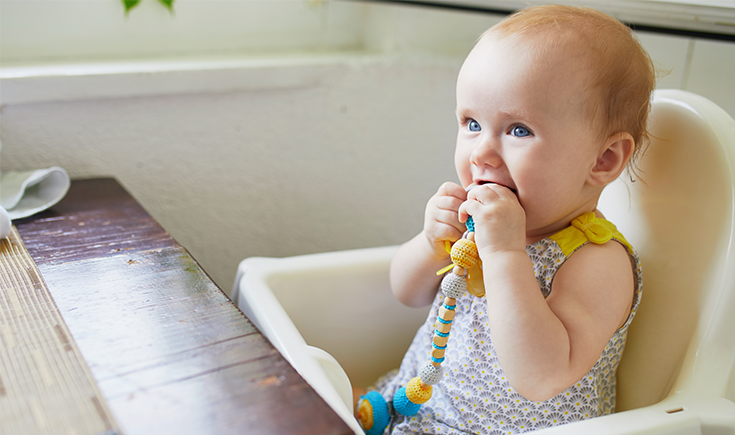

Walk down the baby food aisle of the supermarket and you’ll be faced with a colourful and cleverly marketed array of puffs, yoghurt melts, pouches, bars, and boxes of snack foods claiming to provide various nutrients that your growing baby needs. They’re often quite expensive as well.
So, do babies really need snacks? The baby snack industry certainly thinks they do. Let’s look at whether snacking before the age of one is necessary for their growth and development, when it might be necessary, and when it can become an issue.
Do babies need snacks?
Babies need to be focusing on meals and breastmilk or formula until 12 months as their primary sources of nutrition. Whether they need snacks between meals or not is down to the individual baby.
There are three things to take into consideration first:
1. Babies have high nutritional needs
Due to their rapid and exponential growth and development, every bite a baby takes needs to be as nutritionally dense as possible. Each meal should contain plenty of iron (see why here), zinc, and other essential vitamins and minerals, fats, and carbohydrates.
2. Babies’ appetites vary
Introducing snacks before the age of one can result in some babies naturally reducing their intake of breastmilk or formula, which should be avoided. Even the most nutritious snack most likely won’t contain as many valuable nutrients as their milk source.
3. What snacks shouldn’t be for
We’re all guilty of doing this at some time or another (so, no judgement!), but using snacks as a way of distracting a baby in the pram, out and about, or in the car can set up a negative relationship with food. It teaches them that when they’re bored or unhappy, that food will solve the problem. Instead, we should be helping them to process these emotions, and we need to be accepting of them rather than trying to change them.
Note: Eating whilst moving around or in the car is a choking hazard, so it’s best to avoid entirely, particularly as you may not be able to pull the car over in time. It’s a good time to teach a child that eating only happens while sitting at a table, and always when supervised.
Equally, food should not be used as a reward, or taken away as a ‘punishment’.
What about offering nutrient dense snacks?
Most prepackaged snacks, as mentioned above, are not nutrient dense. Look at the ingredients on the packs, and you’ll see that a lot of them contain sugar in the form of fruit juice, and a lot of air. Babies can also develop a taste for these flavours, making their bowl of vegetables less appealing. Check out Is your baby developing a sweet tooth?
If your baby is on three solid meals, and is meeting their individual breastmilk or formula needs, sometimes a snack could be offered. However, preferably not the shop-bought, highly processed, nutrient-lacking options. Instead, treat it like another meal and offer what you normally would.
For instance, you might need to offer lunch earlier and then offer a second lunch-type meal in the afternoon.
Conclusion
Every baby is different and every day is different, and sometimes babies go through growth spurts when they need extra calories. But, nutritionally-speaking, your baby most likely doesn’t need to snack until they’re around 12-15 months. Save yourself some time and money, and just focus on increasing the nutritional density in each meal. If they often seem hungry between meals, try to pack in more protein and good fats to their meals, and always offer their milk source. Here are some ideas:
- Sprinkle chia seeds on their meals
- Spread avocado or a nut butter on their toast
- Offer a meat or vegetable-based protein with their vegetables
- Drizzle olive oil through their meals
- Stir tahini through their porridge
- Grate cheese over meals
- Roast vegetables in coconut oil
- Add in foods such as quinoa
- Bulk out smoothies or pancakes with almond meal
- Cook meals in bone broths
- Add butter or egg yolks to purees
- Offer a dip such as hummus with soft vegetable sticks
- Babies should only have full fat dairy foods
Have a look at some of our delicious baby food recipes here:























